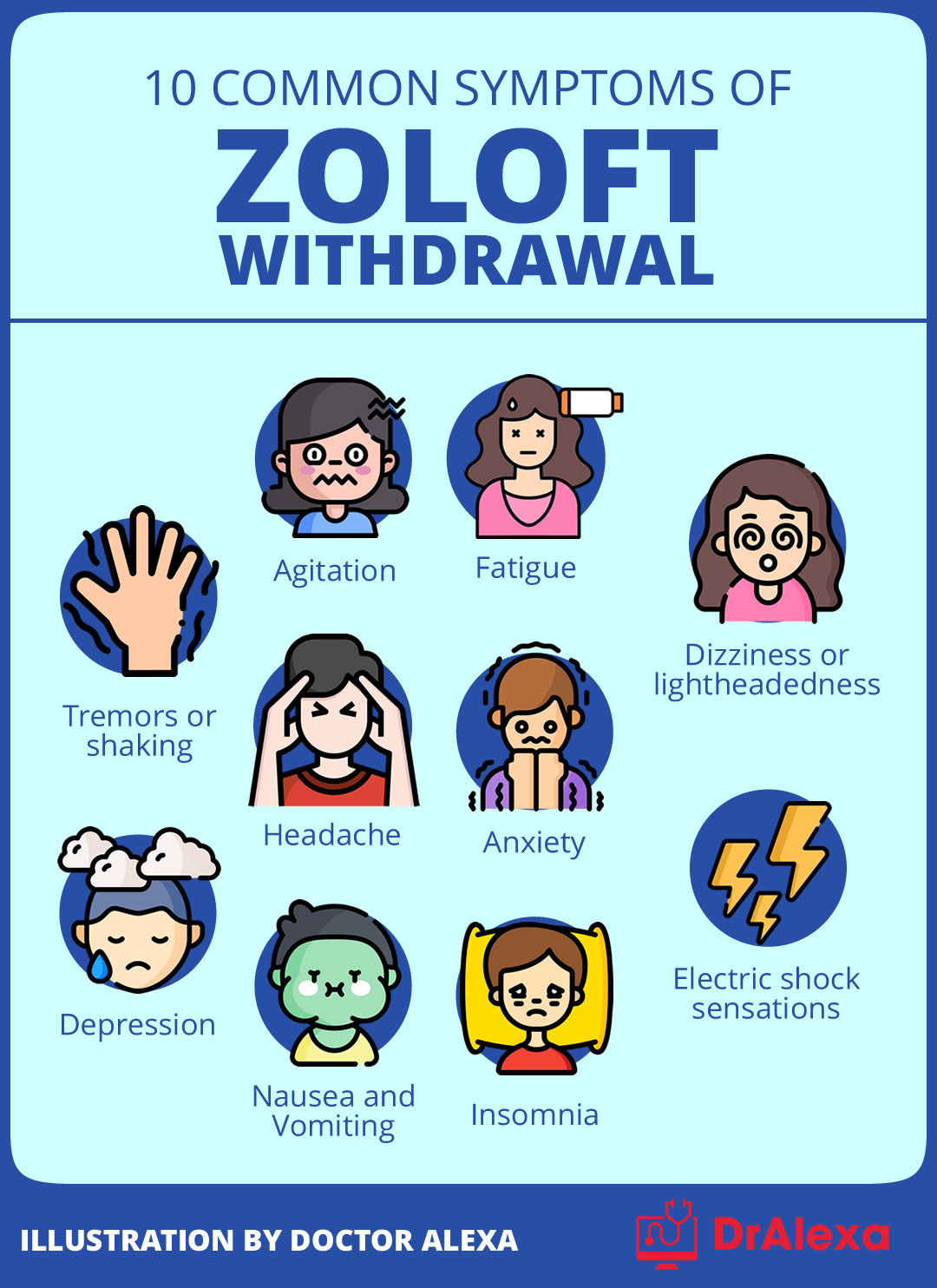Withdrawal from Zoloft (sertraline) can be an uncomfortable and challenging experience for many. Understanding the signs and symptoms of this process is critical to making it a smoother journey. This blog will provide you with all the knowledge necessary to help identify potential Zoloft withdrawal side effects, understand why they’re occurring, and know what measures are available to manage them best.
What Is Zoloft Withdrawal?
About 46 percent of people taking antidepressant medications like Zoloft experience severe withdrawal symptoms.
This can include physical, psychological, and emotional reactions when stopping the medication or drastically reducing their dosage.
People who use Zoloft for an extended period are more likely to experience withdrawal symptoms, especially if they suddenly halt their medication intake.
Therefore, it is essential to consider this factor when considering coming off the medication.
Medical professionals also often caution against quitting the drug cold turkey and may advise their patients on alternative ways to decrease the dosage over time to avoid or reduce unfavorable side effects.
Nevertheless, individuals must seek advice from their healthcare provider as every situation differs.
What Causes Withdrawal?
Antidepressant withdrawal is caused by the sudden discontinuation of any antidepressant medications that were previously taken regularly.
Withdrawal occurs as the body builds up a tolerance to the drug over time.
Users who stop taking it all at once experience adverse symptoms as their body adjusts to functioning without it.
And since serotonin levels in the brain take time to normalize after quitting most antidepressant medications, symptoms may persist for weeks or even months.
For this reason, individuals should contact their doctor before stopping their prescribed antidepressant medication so that an adjustment plan can be created and closely monitored to ensure the safest transition possible.
Zoloft Withdrawal Vs. Addiction
Withdrawal is the physical and emotional discomfort experienced after decreasing or ceasing the use of the antidepressant.
While it is similar to some symptoms associated with drug addiction, it is essential to note that withdrawal from Zoloft is not a sign of addiction.
People taking Zoloft as prescribed may experience mild side effects such as headache, fatigue, and dizziness when they stop taking the medication abruptly.
However, unlike addiction, symptoms of withdrawal usually last no more than a few days.
People with an existing drug addiction disorder should seek medical attention if they consider stopping their use of Zoloft to prevent relapse into substance abuse.
Addiction is when someone has a physical and emotional dependence on certain substances.
Whereas withdrawal is the body’s reaction to adjusting to not having the medication in its system anymore.
Managing withdrawal and addiction requires different treatments and interventions, making it essential to consult a medical professional for the best possible solution.
How Common Is Zoloft Addiction and Abuse?
It is uncommon for people prescribed Zoloft to become addicted or abuse the drug.
Most people who use it don’t experience sudden euphoria or other addictive behaviors.
However, since it is usually taken in long-term doses, it is essential to understand that people taking Zoloft may develop a physical dependence on the drug.
Drug dependence is when the body needs medication to feel normal, and symptoms of withdrawal may occur if the drug is taken away.
If an individual becomes reliant on Zoloft to function normally or experiences undesirable side effects, they should consult their doctor before tapering off the medication.
Withdrawal is common when stopping any antidepressant drug, and Zoloft is no exception.
That said, everyone’s experience is different, and it is essential to consult with a healthcare provider before attempting to stop taking the medication.
Medical professionals can help create an individualized tapering plan that gradually decreases dosage and monitors for potential side effects to make the transition as safe and comfortable as possible.
Additionally, it is essential to be aware of potential triggers that can lead to relapse during withdrawal.
These can range from stress or lifestyle changes to environmental factors such as encountering people, places, or activities associated with past substance use.
Fear of Withdrawal
It may be understandable to be apprehensive about the symptoms of withdrawal associated with antidepressant medications.
However, it is essential to remember that while they can be uncomfortable, these symptoms are usually temporary and manageable with the help of a medical professional.
There are several strategies to reduce or even prevent Zoloft withdrawal symptoms altogether.
These include:
- Gradually tapering the dosage over time
- Taking medications on a regular schedule
- Enlisting family and friends for support
- Practicing healthy coping strategies such as relaxation, mindfulness, and exercise.
- Talking to a healthcare provider about possible medication alternatives
These strategies can make the withdrawal process easier and help ensure a safe transition for people wanting to stop taking Zoloft.
Warnings Associated With Zoloft
While Zoloft is a safe and effective medication for many people, specific warnings are associated with its use.
These include:
Pregnancy: Pregnant women or women planning to become pregnant should not take Zoloft. It can cause congenital disabilities and other complications in unborn babies.
Suicidal thoughts: People taking Zoloft should monitor their mental health and be aware of any changes in mood or behavior that could indicate suicidal thoughts.
Zoloft may increase the risk of suicidal ideation, especially in people under 24.
Drug interactions: Zoloft may interact with other medications and should not be taken alongside certain drugs.
People should talk to their doctor before taking new medicines while taking Zoloft.
Signs and Symptoms of Withdrawal
Antidepressant withdrawal can cause a range of symptoms, including:
- Agitation
- Anxiety
- Depression
- Headaches
- Insomnia
- Nausea and vomiting
- Upset stomach
- Tremors or shaking
- Dizziness or lightheadedness
- Electric shock-like sensations in the body (“brain zaps”)
- Fatigue
If these symptoms occur while tapering off Zoloft, contacting a doctor or mental well-being professional is crucial.
What Are the Emotional Symptoms of Zoloft withdrawal?
Zoloft has been known to cause emotional symptoms such as sadness, irritability, anxiety, and panic attacks.
Other potential emotional symptoms of withdrawal include:
- Loss of interest in activities
- Mood swings
- Crying spells
- Difficulty concentrating
- Feelings of hopelessness or guilt
- Mania
- Agitation
- Anxiety
If these symptoms become severe or persist for more than a few days, it is crucial to talk to a doctor or mental well-being professional for help.
What Are the Physical Symptoms of Withdrawal from Zoloft?
In addition to emotional symptoms, physical symptoms of withdrawal from Zoloft can include the following:
- Nausea
- Vomiting
- Cramps
- Excessive sweating
- Flu-like symptoms
- Muscle aches and pains
- Tremors
- Insomnia
- Dizziness or lightheadedness
- Pins and needles sensations
- Appetite loss
Further, severe physical effects like seizures or heart palpitations can also arise. If any of these symptoms emerge during withdrawal, seek medical help immediately.
How Long Does Withdrawal From Zoloft Last?
Antidepressant medications such as Zoloft can cause various symptoms of withdrawal that vary in severity and duration.
However, most symptoms of withdrawal generally peak within the first few days after stopping or tapering the medication and gradually diminish.
For some people, these effects may last several weeks or even months. The time it takes to withdraw from Zoloft varies from individual to individual and depends on the individual’s dosage, length of use, and other factors.
If withdrawal symptoms are hard to manage, a patient must seek professional help immediately. A doctor or mental well-being provider can offer helpful strategies and suggest alternative treatments that are more suitable.
Factors That Influence Withdrawal From Zoloft
The factors that influence the experience of withdrawal from Zolfotcan vary significantly among those discontinuing the medication. For example, age, how long a person has been on Zoloft, dosage, and any other medicines they take can affect withdrawal.
Even individual body chemistry can come into play when experiencing withdrawal symptoms and side effects. This is why consulting a doctor before starting or ending any drug regimen is paramount for optimal health outcomes.
The most common factor influencing Zoloft withdrawal is when a person has been on it. People tapering off after long-term use may experience more intense withdrawal symptoms due to their bodies becoming accustomed to the medication.
Ultimately, doing the research and having an open discussion with one’s doctor about what to expect and how to manage it is advised to have the most successful Zoloft withdrawal possible.

Zoloft Withdrawal Timeline
The timeline below outlines the general course of Zoloft withdrawal:
24 to 72 hours after stopping: The full effect of the last dose of Zoloft will be felt, with peak withdrawal symptoms occurring. Flu-like symptoms, fatigue, and mood swings may also be experienced.
One to two weeks: Muscle tension, dissociation of feelings and thoughts, and fatigue might be experienced at this withdrawal stage.
Two to four weeks: This is typically when the worst symptoms begin to subside, and their intensity should diminish. Insomnia, appetite changes, and mood fluctuations may still be present.
This still varies from person to person, and the duration of withdrawal may last longer depending on individual factors.
Treatment at Alternative to Meds Center For Withdrawal From Zoloft
In case of severe withdrawal signs, seek professional help immediately. Treatment facilities can provide comprehensive care for those struggling with symptoms of withdrawal.
At Alternative to Meds Center, treatment programs combine various helpful treatments and therapies, such as Qigong, counseling sessions, nutritional support, and many others tailored to each individual’s needs.
These treatments help alleviate the physical side effects of withdrawal and provide long-term health benefits.
Medical, psychotherapeutic, and holistic treatments help people heal from Zoloft withdrawal in a safe, comfortable, and supportive environment.
In addition, experienced staff members can help those with various mental well-being conditions, including those associated with antidepressant withdrawal.
The team works diligently with patients to address underlying issues contributing to their discomfort, providing lasting relief and improved quality of life.
Coping Methods and Relief Strategies
Several coping methods and relief strategies can help ease symptoms of withdrawal from Zoloft.
These include:
Professional support: Seeking professional help is critical for successful tapering off Zoloft or other antidepressants.
A doctor can suggest alternative treatments that suit a patient’s needs. They may also provide lifestyle advice to help individuals manage their symptoms.
Self-care: A good self-care routine can do wonders for mental well-being, helping to relieve stress, anxiety, and other symptoms of withdrawal.
Exercise, meditation, or yoga can be beneficial and calming during this time.
Nutrition: Eating healthy foods rich in vitamins and minerals can help boost energy levels and ease symptoms of withdrawal.
Supportive environment: Creating a supportive environment is essential for successful withdrawal from Zoloft.
This includes being surrounded by positive people who understand a patient’s struggles and are willing to provide emotional support.
Tapering off: Tapering off Zoloft should be done slowly, as directed by a doctor. Doctors may also prescribe medications to ease symptoms of withdrawal.
Discontinuation Vs. Relapse
Zoloft or other antidepressant discontinuation is a process that should be expected; however, it’s essential to understand the differences between discontinuation and relapse.
Discontinuation is a gradual winding-down regime medical professionals prescribe when symptoms may ease.
Conversely, relapse indicates a return of mental issues after the cessation of medications.
Thus, it is crucial for patients to bear in mind these two processes when altering their dosage of antidepressants.
Symptoms of antidepressant discontinuation can range from mild to severe.
They include but are not limited to insomnia, appetite changes, mood fluctuations, nausea, fatigue, and dizziness.
If these symptoms persist or worsen after discontinuing Zoloft, patients may need professional help.
How Common Is Zoloft Addiction and Abuse?
While Zoloft is not generally regarded as an addictive substance, some individuals may develop a psychological dependence on it.
For those affected, this means they might become accustomed to the medication’s impact on their mood or behavior over time.
This can result in feelings of affliction when accessibility to these sources of relief is disrupted or ceased.
Unanticipated gaps in the medicine’s availability can also induce prolonged mental discomfort for a person psychologically dependent on its effects.
Therefore, it is essential to understand that the alleviation from using Zoloft requires more from someone than simply a desire to feel better; consistent and prompt consumption may be necessary to keep signs and symptoms under control.
Read Also: Can You Drink Alcohol on Zoloft? Side Effects and Interactions
What Happens When You Stop Taking Zoloft?
Abruptly stopping Zoloft can cause withdrawal issues due to the sudden decrease of its presence in the body.
The resulting physical and emotional discomfort can range from sleeplessness, headaches, vertigo, and sudden mood changes to flu-like symptoms.
It is vital for anyone wishing to stop taking Zoloft to do so under the guidance of professional medical supervision.
It is not recommended to suddenly stop taking any psychiatric drug without being closely monitored for potential risks associated with ending treatment.
Symptoms of withdrawal may vary depending on the individual and how long they have been taking Zoloft, although most symptoms should resolve within two to four weeks after the treatment has stopped.
Is Zoloft Safe for Long-term Use?
There are no known long-term effects associated with Zoloft use, so it is considered a safe and effective treatment option for the long-term management of mental issues.
Despite this, knowing that individuals could react differently to medications is essential.
Therefore, if patients notice any uncommon changes in their bodies or thoughts after consuming Zoloft for an extended period, they should immediately contact a doctor and assess the issue.
Tips for Coping With Withdrawal From Zoloft
As mentioned above, sudden discontinuation of Zoloft can bring on symptoms of withdrawal. It is essential to follow these specific tips to mitigate the severity and duration of these reactions:
– Gradually reduce the dosage as advised by a doctor or mental health professional
– Take steps to manage stress, such as exercise, mindfulness, talk therapy, or other relaxation techniques
– Increase intake of essential vitamins and minerals, such as omega-3 fatty acids, B vitamins, and magnesium
– Ensure a healthy diet that consists of whole grains, fruits, vegetables, and lean proteins
– Reach out to loved ones or support groups for additional emotional support
To make the withdrawal process more manageable for patients, doctors sometimes suggest taking over-the-counter medications such as antihistamines or pain relievers.
However, discussing this with a healthcare provider before beginning any medication or supplement regimen is essential.
How To Quit Taking Zoloft Safely
The half-life of Zoloft is around 26 hours, meaning it takes approximately two to three days for the body to eliminate half of the drug.
For this reason, a doctor must supervise any attempt to quit taking Zoloft to avoid severe symptoms of withdrawal.
It’s best to decrease the dosage slowly over time under medical supervision. This helps ensure that the process is as smooth and comfortable as possible, with minimal side effects.
A physician might ask the patient to take half the recommended dosage daily and gradually decrease it until they no longer take any Zoloft.
Although it ultimately depends on the individual’s medical history and circumstances, consulting a doctor before reducing or stopping Zoloft dosage is essential.
How To Prevent Withdrawal From Zoloft
It can be challenging to prevent withdrawal from Zoloft altogether. The best way to reduce the risk of experiencing symptoms of withdrawal is to slowly taper off the medication with guidance from a doctor.
This process may take several weeks, but it can ensure that the patient does not experience sudden changes in their body or mind due to stopping Zoloft too quickly.
The patient should also inform their physician of any concerns they have during tapering.
It’s wise to prioritize stress management to maximize the efficacy of Zoloft and promote overall well-being.
This can be achieved through proper nutrition, regular physical activity, good sleep habits, and happy activities.
When To See a Doctor
It is imperative for anyone taking Zoloft to be mindful of any changes in their mental and physical health, both major and minor.
If anything out of the ordinary occurs, they should promptly discuss it with their a doctor, as this may be linked to taking Zoloft.
Furthermore, ending this medication without a physician’s guidance or instruction carries serious risks.
Severe side effects from discontinued use of Zoloft can occur and necessitate medical attention.
Thus, consulting with a trusted doctor before stopping Zoloft is advisable for maintaining health and safety.
While taking Zoloft, if any side effects worsen or new ones appear, it’s imperative to contact a medical professional immediately and assess the issue.
Additionally, any interactions between this medication and other drugs should be considered.
It is also essential to look for warning signs of heightened anxiety or suicidal ideation while taking medicine. If either occurs, the patient must contact medical help right away.
Frequently Asked Questions (FAQs)
The withdrawal process may be different from individual to individual. Generally speaking, some common side effects of withdrawal from sertraline include the following:
- Nausea
- Flu-like symptoms
- Anxiety
- Insomnia
- Headaches
- Irritability
- Agitation
- Hallucinations
- Muscle tension
- Changes in appetite
More severe symptoms, such as seizures or psychosis, are possible but less likely.
It is recommended that patients talk to their doctor about a gradual reduction in dosage to help minimize any discomfort associated with tapering off Zoloft.
Additionally, incorporating stress management techniques such as meditation and exercise into a daily routine may help relieve symptoms of SSRI withdrawal.
While these safety measures may be sufficient for some, it is essential to consult a medical expert if persisting symptoms arise after treatment discontinuation.
Each patient’s circumstance should be considered when determining the necessary steps for relief.
It is possible to experience symptoms of withdrawal after a week of taking Zoloft.
However, it ultimately depends on the individual’s body and specific circumstances.
Before ceasing Zoloft treatment, it is imperative to consult a doctor for advice.
A physician can provide direction on gradually reducing the dose and help manage any withdrawal symptoms that might appear.
Additionally, one should remain attentive to their physical and mental reaction as there is always a possibility that the drug may have an unexpected effect on them.
Yes. Nightmares and other sleep disturbances can be a common withdrawal effect of Zoloft.
It is wise to speak with a doctor if any sleeping difficulties arise during tapering, as it could indicate an underlying issue requiring medical evaluation.
Abruptly stopping Zoloft or any other SSRI antidepressant can have serious consequences. This is because the body needs time to adjust and readjust to the chemical changes within it.
The most common side effect of abrupt discontinuation is “antidepressant discontinuation syndrome” — symptoms ranging from mild to severe.
Antidepressant discontinuation syndrome symptoms may include:
- Nausea
- Dizziness,
- Headaches,
- Body aches and pains,
- Fatigue,
- Irritability,
- Insomnia,
- Nightmares or vivid dreams.
In some cases, the side effects of abrupt discontinuation can be so severe that medical attention is needed for the patient to feel better.





